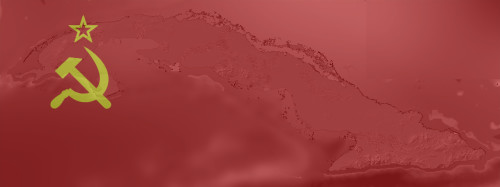So, I’m a refugee. I don’t mean that as a statement of solidarity like Je suis Paris or Je suis Charlie. I mean it literally. I and my family came to the U.S. as refugees.
And make no mistake. My country of origin represented a formidable ideological as well as tactical enemy. Despite the reality of Soviet Operation Anadyr, we were still welcomed into the US community knowing full well that my nation of origin had demonstrated itself to be a singular and terrifying threat to the welfare of US citizens when that same Operation Anadyr evolved into the better known Cuban Missile Crisis. That event brought to Cuba – 90 miles away from the US mainland – intermediate-range nuclear-armed missiles with operational ranges of 2,000 miles. That meant that not only was Miami within the strike zone as a target, so were New Orleans, Houston, Dallas, Denver, Chicago, Boston, New York, DC and Atlanta. And the Cuban president, Osvaldo Dorticós Torrado, under direction by Fidel Castro, said, “If … we are attacked, we will defend ourselves. I repeat, we have sufficient means with which to defend ourselves; we have indeed our inevitable weapons, the weapons, which we would have preferred not to acquire, and which we do not wish to employ.”
The threat was direct, real and immanent. President Kennedy spoke with the nation describing the options and sobering realness of the danger. The Cuban Missile Crisis became the closest moment the world would come to nuclear war. Political scientist Dr. Graham Allison, would write fifty years later that the Cuban Missile Crisis could have resulted in a war that “might have led to the deaths of 100 million Americans and over 100 million Russians.” For perspective, the population of the United States in 1960 was 180 million.

[Photo Credit: M. Tejeda-Moreno]
And when we arrived, the United States was mired in worry about the radical and dangerous ideology espoused by my birth nation. The decade leading up to the Cuban Missile Crisis also saw a US-launched social inquisition to ferret out communists, which targeted all strata of American society. We launched one war to halt that ideology on the Korean peninsula, and we were revving up for a new and similar conflict in Vietnam. We launched a 40-year Cold War to limit the spread of politically dangerous, even radical ideas. And Castro was now proving to be no minor demagogue; he was a silver-tongued charismatic fascist whose commentaries tore into Americanism and were slowly propelling him as the ideological leader of the non-aligned nations.
When we arrived on a plane with only our clothes, we were asked if we were communists. My father answered “No” and that was good enough. We were given food, clothes and papers. We didn’t speak English. We were just released in to society. We were able to go anywhere we wanted. So we did. And I was raised as an American Southerner- sweet tea, pecan pie and country ham. I grew up going to bonfires, saying y’all and wondering why the Devil would want to beat his wife in the first place but especially when it rains while the sun is out.
That America didn’t follow us. It didn’t vet us. It didn’t stalk us. That America wasn’t concerned about us. That America knew that the Enlightenment Values on which it was founded welcomed dialogue – even challenges – to strengthen its social, economic and ideological system. Our immigration would strengthen America. That America saw hospitality, not fear, as a core value. That America was concerned about living up to its ideals; the ideals distilled by Emma Lazarus in her poem The New Colossus etched on a plaque inside the Statue of Liberty, a Pagan Roman goddess.
Classical religion might be a good place to start as we take a look at how our Ancestors understood hospitality. Zeus – the Great Presider over the Greek Olympians – is commonly associated with lightning and weather. But he has other paths. And one of them is Zeus Xenios, the protector of all strangers and suppliants of mercy. The important message Zeus was conveying is that all strangers have a right to hospitality. And abuses of hospitality brought the wrath of Gods, lightning-fast.
The Romans took hospitality to both public and private spaces. Like their Greek Ancestors, they codified – legally – the duties of the host, whether it was an individual to an individual or even a city to another city. Hosts and guests entered into a contractual space that was sacred and overseen by Jupiter Hospitalis. There was a duty to be hospitable, and the onus was on the patron not the guest. The patron has all the power in that relationship and alone has the opportunity to be gracious. It as the stuff of serious divine attention and counsel. And the Greek and Roman Gods didn’t just advise on proper behavior, they enshrined that understanding and relationship within a covenant overseen by their most powerful.
They weren’t alone. Radegast from Slavic Religion means “Dear Guest” and is the overseer of hospitality. We know little about him. But we do know the etymology of his name and it reveals his patronage of travelers, suppliants and foreigners.

[]Photo Credit: Manny Tejeda-Moreno
In the North, our Norse and Viking Ancestors took hospitality no less seriously. While the Hávamál warns of the dangers of too much hospitality in verse 136, it begins with stanza after stanza of proper behavior and generosity of both guest and host. And it’s not just there, the stories of gift-giving and hospitable behavior is found in other recovered texts like Auðun of the Westfjords and the Bandamanna saga (also called the Saga of the Confederates). In the former, generosity is a mark of kings. In the latter, it is a central mark of good character more valued than wealth and authority.
Lukumí approaches hospitality in a different way. There is only one reason for food to be on your table: to be shared. No guest should leave your home thirsty or hungry. It is reminiscent of Orisha Inle, the physician of the Orisha. He is also a great hunter and a great healer, privy to wisdom of herbs. His name means “The food given by the Earth” and he makes us aware that Earth can provide for our needs but more importantly on the power of hospitality. For he reminds us that we are guests on this planet. And if it were not for Earth’s hospitality, there would be no “us.”
What our Ancestors understood deeply is that there is a difference between tribes and tribalism. And that fear of others will tear your society apart. It was a matter of survival: because tribes are good; but tribalism, not so much.
While they sound conjoined, tribes and tribalism are different. Tribes, of course, refer to a social group, and particularly social groups that existed before the rise of modern nation-states. Tribes are sometimes related to kinship – having familial connections – but they don’t have to be. Nor do they have to be primitive, indigenous, lineal or monarchical. Tribes are a group of people with a shared culture offering mutual support. Tribes often have codes for ritualized behavior and they have a generally common interpretation of the world around them. As Margaret Mead’s biographer Jane Howard wrote, “Call it a clan, call it a network, call it a tribe, call it a family: Whatever you call it, whoever you are, you need one.”
Collectively, Pagans might be considered one tribe. We have interpretations of the world that are different from those of Abrahamic religions and we have our own codes and rituals that help us understand ourselves within our own society. If I say the word “circle,” Pagans tend to hear a complexity that non-Pagans would likely not see.
Tribalism, however, is a behavior. It is an advocacy wherein those positive values of the tribe – the interpretations of the world, for example – become an ethnic identity of exceptionality. Tribalism begins to use the language of identity for inclusion while using disparaging epithets for members of other groups. That path leads to the dehumanization of others by building oversimplified views of the world and our relationship to it. It creates solid paths to suspicion and untimely buttresses a plague of stereotypes that classify the others into packages on a continuum of distrust.
Tribalism overrides rationalism. It builds its own morality and pervades our notions, not just of the world as it is, but how the world should be. It is facilitated by clothing, language, and access to power. It reinforces itself by creating a shared experience and interpretation of why others are wrong in their worldview. And it builds guideposts – even quests – to assure allegiance and membership. And it also goes wrong- very, very wrong.

[Photo Credit: M. Tejeda-Moreno]
It is a cocktail for irrationality. And it seems to be in full swing today in our society. Everywhere in the media, we are bombarded by imagery and commentary about how our way of life is under assault. We are told and shown that there is a powerful other lurking out there conducting attacks on us requiring us to strike first in defense.
The rhetoric even takes dark twists. On my social media feeds, I’ve seen commentaries marginalizing Muslims and describing Syrian refugees as a horde coming to undermine our culture. We block desperate people at borders, offering no safe havens and turning our backs to those in need. And we have justified these behaviors because even if “they” are good, some “evil” will get in and wreak havoc on us. We’ve ramped up the rhetoric of fear to the point of frenzy. My social media feed bears testament to the scope of anxiety, distrust, and panic. It is that deadly horde of others that awaits to bring destruction.
Yet, we don’t seem to care that 32,719 people died on US highways in 2013; 6,000 because of texting. 1,000 people die yearly from autoerotic asphyxia every year. 450 people are killed annually by falling out of their beds. Vending machines kill 13 people on average every year. Coconuts, 150 deaths annually. Lunch causes more than 3,000 deaths annually. 5,000 people in the US die from raw meat consumption. And, then there are hippos – yes, hippos – about 3,000 people killed by them each year (mostly in Africa because that’s where hippos are).
The blunt reality is that the threat of terrorism is minuscule. It is undoubtedly serious. It is also dramatic, shocking and saddening. But it is statistically minuscule. Terrorists want to spread loathing and fear to show the hypocrisy of our values. Sadly, many are caving to that hypocrisy. And it is precisely here where Pagans have an important role to play.
Fear has never been a guide. That first time we went to a festival. That first time we spoke to a witch. Or that first time we thought, “maybe God is a woman.” We worked through our fear. We know the false promise and perverse security fear tries to construct. It is barren in what it can offer. And we must teach this to others. Fear has no place among us. None.
We also know that too many, we were – and are – the other. That we are to be feared. Yet we promoted healing, reconciliation, and awareness. We were hospitable to each other. We have found a path that judges behavior, not belief. And we’ve done that rejecting fear, rejecting tribalism and rejecting violence. It is our moment to teach.
Terrorist attacks are acts of extremism to cultivate hate. And some of us are falling for that too. But we know that Hate is just a mask for Fear. What terrorist organizations want is to ignite our fear because it will fuel our tribalism; because that will burn our values. What our Ancestors taught is that hospitality will never let that fire spread. And this refugee thanks them.
References
Allison, G. (2012). “The Cuban Missile Crisis at 50”. Foreign Affairs 91(4). Retrieved 1 Dec 2015.
Bettencourt, A. B., Dorr, N., Charlton, K., & Hume, D. L. (2001). Status differences and in-group bias: A meta-analytic examination of the effects of status stability, status legitimacy, and group permeability. Psychological Bulletin, 127, 520-542.
Sahlins, M. D. (1961). The segmentary lineage: An organization of predatory expansion. American Anthropologist, 63, 332–345.
The Wild Hunt is not responsible for links to external content.
To join a conversation on this post:
Visit our The Wild Hunt subreddit! Point your favorite browser to https://www.reddit.com/r/The_Wild_Hunt_News/, then click “JOIN”. Make sure to click the bell, too, to be notified of new articles posted to our subreddit.

Very well-written and very meaningful. Thank you.
Manny, this is brilliant in structure and thoughtful. Very well written. I have faced this struggle within Heahenism, and now I see the ugliness of Tribalism / Ethnocentric fear based rhetoric finding ready and willing ears like never before in society at large. I hope your words find their way into more minds yet wondering which way to lean. Thank you for your work!